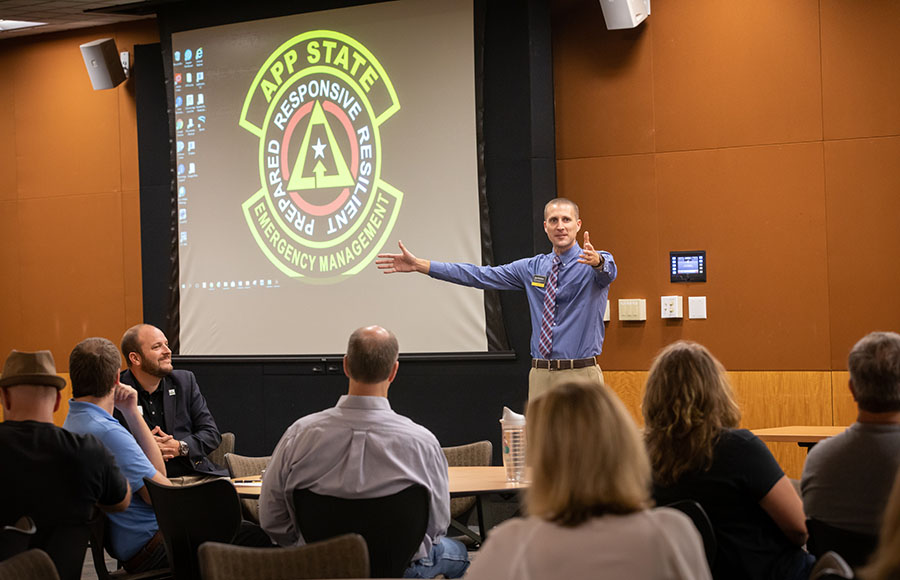
Jason Marshburn, director of environmental health safety and emergency management at Appalachian, talks about his deployment to the N.C. coast following Hurricane Florence’s path across the state in 2018 at the Building Emergency Team workshop on Appalachian’s campus Sept. 13. Photo by Marie Freeman
BOONE, N.C. — Safety is always foremost at Appalachian State University and preparedness is key, according to Appalachian’s Department of Environmental Health, Safety and Emergency Management (EHS&EM).
During National Preparedness Month in September, the theme of which was "Prepared, Not Scared," Appalachian’s EHS&EM department stressed the importance of preparedness and shared best practices from the University of North Carolina System with the Appalachian Community by participating in on-campus events. National Preparedness Month is recognized by the Federal Emergency Management Agency (FEMA) to promote family and community emergency planning.
“At Appalachian, standard preparedness procedures include proactive, advance planning, regular updates with safety and management teams, ongoing education of the public, crisis response practice and review and collaboration with local partners,” explained Jason Marshburn, director of EHS&EM at Appalachian.
“Appalachian’s building emergency teams are trained to help respond to and evacuate buildings on campus in an emergency,” he continued. “They are also trained to support occupants during an incident.”
Each September, Appalachian hosts Safety Week, a campus event designed to build awareness about resources and policies within the Appalachian Community. The week includes a safety festival on Sanford Mall, where students, faculty and staff connect directly with Appalachian’s safety and wellness professionals.
During National Preparedness Month, the EHS&EM department also hosted workshops for Appalachian faculty and staff, covering basic preparedness measures to highlight how Appalachian manages emergencies. These workshops provided space to examine some of the major incidents that affected Appalachian’s campus in 2018, such as Hurricane Florence and Winter Storm Diego, as a basis to help plan for future events.
UNC System institutions from across the state participated with local emergency management personnel from the town of Boone and Watauga County in the Building Emergency Team workshop, organized by the EHS&EM department. Members and partners heard about incidents in the UNC System and how the responses to these incidents were coordinated, Marshburn said. The workshop participants also learned about the roles responders played.
Chris Gonyar, director of emergency management at UNC-Charlotte, shared his first-hand experiences at the workshop, reinforcing the importance of advance training and planning for emergencies.
Goynar said full-scale planning and training exercises on his campus around launching a parent and family assistance center were extremely helpful. “Had we not done that exercise (before an on-campus event occurred), it would have been very difficult for us to put together the staffing and organization for a family assistance center when the situation demanded one,” he said.

Derrell Jeter, director of emergency management for the University of North Carolina at Chapel Hill, presents best practices and lessons learned during Appalachian’s Building Emergency Team workshop held on the university’s campus Sept. 13. Jeter’s presentation focused on his experiences during a water loss incident on the campus of UNC-Chapel Hill earlier this year. Photo by Marie Freeman
Darrell Jeter, the director of emergency management and planning at UNC-Chapel Hill, also presented at the workshop, sharing how his team responded to a water loss incident on Chapel Hill’s campus. Additionally, Marshburn detailed his deployment to the North Carolina coast to help with Hurricane Florence response efforts last year.
Although National Preparedness Month activities for 2019 have come to an end, Marshburn stressed the importance of individual preparedness for the emergencies most likely to impact the Boone area, such as the upcoming winter weather.
Building a kit with essentials like battery-operated radios, shovels and ice scrapers, and establishing a communication plan with family and friends that includes registering for AppState-Alerts, which convey emergency information quickly, are some of the measures Marshburn recommends Mountaineers take to get “winter ready” at Appalachian.
Learn more about Appalachian’s Department of EHS&EM and how Appalachian stays prepared by visiting emergency.appstate.edu.
What do you think?
Share your feedback on this story.
About the Office of Environmental Health, Safety and Emergency Management (EHS&EM)
The Office of Environmental Health, Safety and Emergency Management (EHS&EM) at Appalachian State University works in coordination with other university departments to support App State's commitment to campus safety. The office’s primary responsibility is environmental health, safety and emergency management functions across App State’s Boone and Hickory campuses. EHS&EM also coordinates App State’s on-campus emergency medical service (EMS) program, Mountaineer Medics, which provides emergency medical care and support to the App State Community. Learn more at https://ehsem.appstate.edu.
About Appalachian State University
As a premier public institution, Appalachian State University prepares students to lead purposeful lives. App State is one of 17 campuses in the University of North Carolina System, with a national reputation for innovative teaching and opening access to a high-quality, cost-effective education. The university enrolls more than 21,000 students, has a low student-to-faculty ratio and offers more than 150 undergraduate and 80 graduate majors at its Boone and Hickory campuses and through App State Online. Learn more at https://www.appstate.edu.







![How NCInnovation Is Rethinking Economic Development in North Carolina [faculty featured]](/_images/_posts/2026/02/rethinking-economic-development-600x400.jpg)







